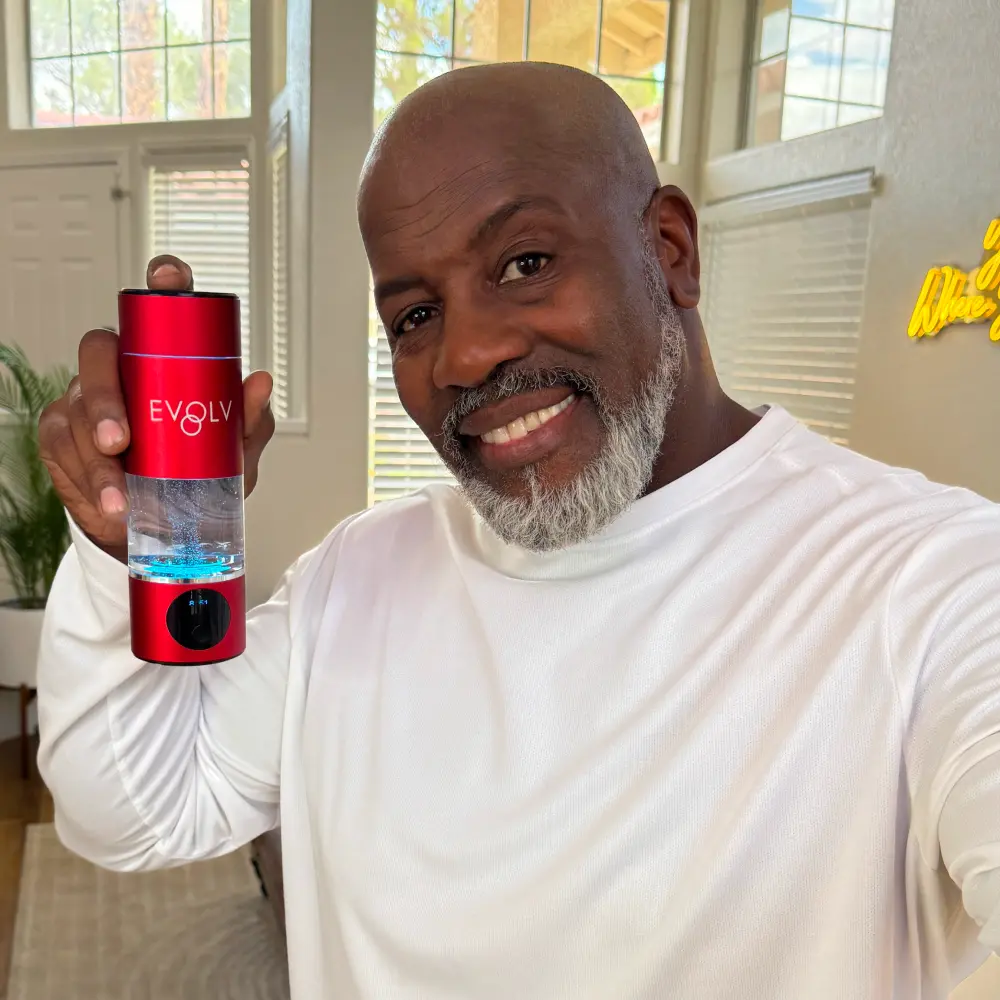
From elite athletes to longevity experts, the buzz around hydrogen water, especially ionized hydrogen water, is growing louder. But what exactly is it? How does it differ from other “enhanced” waters? And more importantly: does the science back it up?
In this article, we’ll break down the chemistry, explore peer-reviewed studies, and give you a grounded, evidence-informed perspective on how ionized hydrogen water works and why it might matter for your health.
What Is Ionized Hydrogen Water?
Ionized hydrogen water is water that has undergone electrolysis, a process that separates hydrogen (H₂) and oxygen (O₂) gases from water (H₂O) using an electric current. The resulting water contains dissolved molecular hydrogen gas (H₂) and typically has a negative oxidation-reduction potential (ORP), meaning it has antioxidant properties.
This water is often:
Alkaline (higher pH)
Rich in dissolved hydrogen gas (H₂)
Low in oxidation potential (ORP between -300 to -800 mV)
⚠️ Note: Not all ionized water contains hydrogen gas. Some alkaline ionizers raise pH without saturating the water with H₂. True ionized hydrogen water must contain molecular hydrogen (H₂) to deliver the benefits studied in research.
How Does It Work in the Body?
Hydrogen gas (H₂) is the lightest and most bioavailable antioxidant known. When you drink ionized hydrogen water:
-
H₂ molecules dissolve into your bloodstream via the gut lining.
-
They penetrate cells and mitochondria, where oxidative stress occurs.
-
H₂ acts as a selective antioxidant, neutralizing only harmful free radicals (e.g., hydroxyl radicals) without disrupting useful signaling molecules like nitric oxide or hydrogen peroxide.
It also crosses the blood-brain barrier, making it particularly interesting for neurological protection.
What the Research Shows
Here’s what peer-reviewed studies have found about molecular hydrogen, primarily delivered via ionized hydrogen water or hydrogen-rich water:
1. Reduces Oxidative Stress
A key 2007 study published in Nature Medicine showed that H₂ selectively reduces hydroxyl radicals in vivo, with therapeutic antioxidant effects.
Ohsawa et al., 2007 – Nature Medicine
2. Improves Metabolic Health
Drinking hydrogen-rich water reduced oxidative stress and improved lipid/glucose metabolism in individuals with metabolic syndrome.
Kajiyama et al., 2008 – Medical Gas Research
3. Supports Athletic Performance & Recovery
Athletes drinking hydrogen water had lower blood lactate levels and recovered faster post-exercise.
Aoki et al., 2012 – Medical Gas Research
4. Promotes Brain Health
Hydrogen reduced inflammation and oxidative damage in models of Parkinson’s disease and traumatic brain injury.
Itoh et al., 2009 – Neurobiology of Aging
5. Improves Quality of Life
A 2010 study found hydrogen water improved mood, energy, and sleep quality in patients with mild health complaints.
Nakao et al., 2010 – Medical Gas Research
Common Misconceptions (and the Facts)
|
Myth |
Fact |
|
Ionized water = hydrogen water |
Only hydrogen-rich ionized water delivers molecular hydrogen (H₂). Not all alkaline/ionized water contains H₂. |
|
Alkaline water is what makes it healthy |
It's not the pH, but the molecular hydrogen content that brings measurable benefits. |
|
More hydrogen = better |
Most clinical studies use concentrations of 0.5–1.6 ppm. Higher isn’t always better. |
|
It's unsafe or untested |
Molecular hydrogen has GRAS status and has been used in clinical trials for years with no significant side effects. |
Review paper – Ichihara et al., 2020 – Med Gas Res.
How to Get It (and Use It Safely)
You can access ionized hydrogen water in a few ways:
Electrolysis Machines (Ionizers)
Permanently installed under sink or countertop
Generates hydrogen-rich alkaline water
Varies in H₂ concentration based on machine quality
Portable Hydrogen Water Bottles
Use electrolysis to produce H₂ on the go
Great for travel or daily use
Look for third-party tested ppm ratings
Hydrogen Tablets
Dissolve magnesium-based tablets into water
Can generate higher ppm (up to 10 ppm) if used correctly
Ideal for short-term therapeutic use
Pro Tip: Use a closed container to preserve H₂ concentration, and drink within 20 minutes to maximize benefits.
Is It Safe?
Yes. Multiple animal and human studies have shown no toxicity even at high doses. Hydrogen gas is inert, non-reactive, and exhaled through the lungs after cellular absorption.
The U.S. FDA recognizes hydrogen gas as GRAS (Generally Recognized As Safe) for consumption. FDA GRAS notice #520
Final Thoughts: Why It Matters
Ionized hydrogen water isn’t just a wellness trend, it’s a promising area of research in oxidative stress, chronic disease prevention, and overall cellular health. While it’s not a cure, it offers a low-risk, evidence-supported way to support your body’s antioxidant defense system.
For anyone looking to:
Improve recovery,
Support metabolism,
Protect long-term brain health,
Or simply feel more energized and balanced,
Scientific References & Peer‑Reviewed Studies with Links
Kajiyama, S., et al. (2008) — Supplementation of hydrogen‑rich water improves lipid and glucose metabolism in patients with type 2 diabetes or impaired glucose tolerance. Medical Gas Research (published in Nutrition Research). Read it here: (Nature, PubMed)
https://pubmed.ncbi.nlm.nih.gov/19083400
Aoki, K., et al. (2012) — Pilot study: Effects of drinking hydrogen‑rich water on muscle fatigue. Medical Gas Research.
Itoh, T., et al. (2009) — Protective effects of hydrogen against neurodegenerative diseases. Neurobiology of Aging.
Nakao, A., et al. (2010) — Effectiveness of hydrogen water on quality of life of patients. Medical Gas Research. Visit: (PubMed, J-STAGE)
https://www.jstage.jst.go.jp/article/jcbn/46/2/46_09-100/_article










